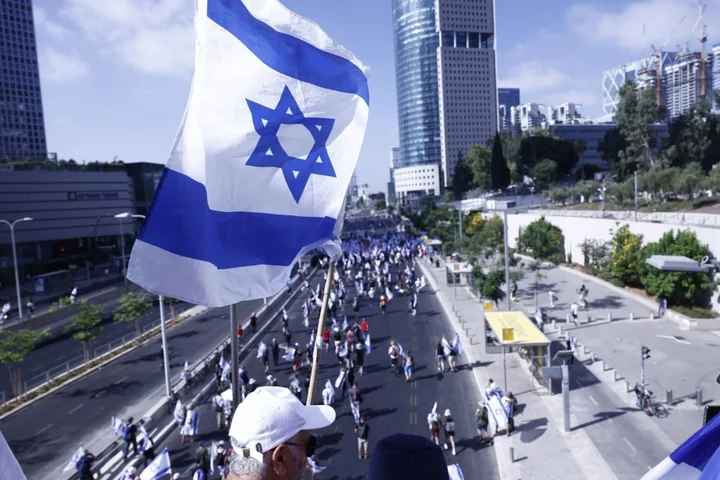Sixteen members of a roving paid workforce. A volunteer steering committee of former military chiefs of staff, public-relations gurus and top-tier lawyers who speak daily. A budget in the tens of millions of dollars.
Israel’s anti-government protest movement, the largest in the nation’s history, has taken over the streets for seven months since plans emerged to weaken the power of the courts. On Saturday night, they again brought hundreds of thousands out. But they are not radicals neglected by the establishment — they are the establishment. And they are using traditional symbols like the flag to fight the populist policies of Prime Minister Benjamin Netanyahu.
“This is the backbone of Israeli society — people who’ve founded companies and headed large organizations,” says Shikma Bressler, a physicist and protest leader. “Some have carried out special military operations.”
“People arrested on the streets include CEOs of unicorns,” she adds, referring to the term for a startup valued at more than $1 billion.
Five other activists with inside knowledge gave behind-the-scenes details on condition of anonymity.
They estimate that 270 groups are active, involving some 800,000 individuals. They’ve deployed scores of photography drones, mobilized late-night operations to wrap monuments with slogan-filled banners, and sent out thousands of women dressed in the red capes and white bonnets of the Margaret Atwood novel “The Handmaid’s Tale.”
They succeeded in stopping Netanyahu’s right-wing religious government from rushing the entire judicial overhaul through the Knesset, as the parliament is known. With the government preparing to pass at least one key change, the movement is calculating its next steps.
Netanyahu’s plans have unnerved global investors, with Israel’s stocks, bonds and currency performing badly this year relative to similar assets in other countries. The US has also criticized the overhaul.
“We will have to direct our efforts against actions that will become possible under the new law,” says Bressler.
Her grassroots group, known as the “Kaplan Force,” after a street in central Tel Aviv that has hosted the weekly Saturday night demonstrations, is the largest. And she’s become the face of the movement.
She’s not new to the demonstration business. She led anti-corruption protests against Netanyahu starting in 2019. That meant that when the judicial overhaul arose seven months ago, the group had a solid infrastructure for getting people onto the streets.
There are 140 sectoral or professional groups of military reservists, high-tech executives, women’s-rights activists, doctors and lawyers. At the Saturday night protests, they occupy the same spot, like at a farmers’ market. Some 130 additional groups organize local demonstrations across the country.
The groups are independent, with their own WhatsApp groups and agendas, but they quickly realized they needed funding and collaboration. This is how protest headquarters came about.
“Free in Our Country”
The oversight group goes by the name “Hofshi b’artzenu,” a Hebrew quote from Israel’s national anthem meaning “Free in our country.” Its 16 employees are full and part time and rotate among donated workspaces in different high-tech offices. The chief executive officer is Eran Schwartz, a former air force pilot and deputy general manager at the Ministry for Social Equality. Another employee is Daria Shaked Henig, a former venture investor dedicated to promoting women in Silicon Valley.
The team is overseen by a steering committee. Some are household names in Israel: Dan Halutz and Moshe Ya’alon, both former military chiefs of staff; Dina Zilber, aformer deputy to the attorney general; Gilead Sher, a top lawyer; and Yossi Kucik, a business consultant. Sher and Kucik both worked for former Prime Minister Ehud Barak, who’s attended some of the protests.
Others include top business leaders such as Orni Petrushka, one of Israeli high tech’s founding fathers; Zohar Levkovitz, a tech entrepreneur and venture investor; Ilan Shiloah, former CEO and chairman of Israel’s largest advertising firm; and Itay Ben Horin, owner and CEO of a major public relations firm.
Hedge Funders Drive Protests in Battle Over Israeli High Court
They hold weekly meetings to discuss trends and provide the organizations’ back-office services that mainly involve funding allocations, strategic planning and legal assistance — so far, they say, 800 protesters have been arrested.
The high-powered nature of the protesters can cause friction. There are frequent disagreements on tone or direction. One of the steering committee’s main roles is to make peace and keep the movement united.
The operation’s funding, estimated in the low tens of millions of dollars, is provided by private donors and crowd sourcing. Committee members say 90% of donors are Israeli, and they don’t accept money from governments or politically affiliated organizations. The money is channeled through a nonprofit called “Future Blue and White,” established by Sher and Petrushka in 2009 to promote Israeli democracy and the two-state solution with Palestinians.
Elite Reservists
The street protests rely heavily on elite military reservists. Last spring, what stopped the overhaul in its tracks was an increasing number of combat-pilot reservists threatening to stop volunteering. Defense Minister Yoav Gallant said security was at risk and called for the legislation to stop.
Now that a law barring judges from declaring government action “unreasonable” is headed for final passage in the Knesset, reservists — who play a key part in military operations — are once again vowing to get involved. On Friday, 1,142 Air Force reservists, including 422 pilots, signed a letter saying they’d abstain from volunteering if the bill becomes law.
Ten thousand other reservists issued a similar threat on Saturday. Gallant hasn’t backed them but there have been last-minute talks on a on a possible compromise. It’s a game of intense brinkmanship.
If the current bill does pass, attention will turn to whether the government advances a second part of the judicial overhaul, to ensure judge selections are driven more by political parties.
Bressler, the physicist, says, if so, the protests will adjust — but not stop.
“No one knows in what way this will manifest itself in Israel,” she said. “It’s unfathomable, but the whole reality now is unfathomable.”

